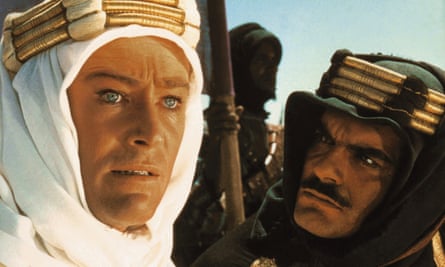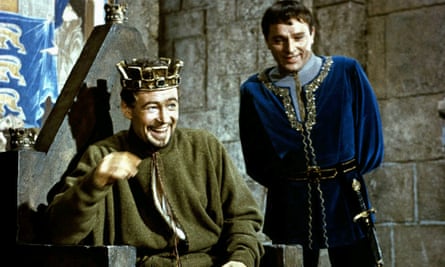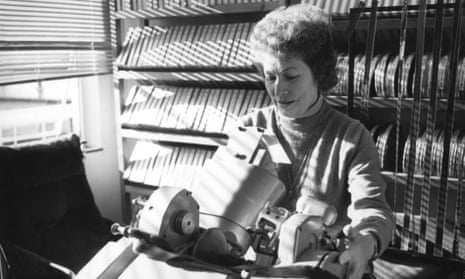Anne V Coates, who has died aged 92, edited more than 50 films during a prolific career that lasted for six decades. She was best known for her work on Lawrence of Arabia (1962), for which she won an Oscar. She received further Oscar nominations for Becket (1964), The Elephant Man (1980), In the Line of Fire (1993) and Out of Sight (1998).
Even though she was a niece of J Arthur Rank, founder of the Rank film company, Coates was not allowed to go to the cinema as a child, but in her teenage years she saw film adaptations of such literary classics as Jane Eyre, Wuthering Heights and Henry V. She had found the books heavy, even boring, but the powerful effect on her of the cinema versions persuaded Coates that she would like to be a film director, rather than a racehorse trainer – her first ambition.
Born in Reigate, Surrey, daughter of Laurence Coates, an architect, and his wife, Kathleen (nee Rank), Anne was educated at fee-paying schools. While trying to find a way into the film industry, she worked as a nurse at Sir Archibald McIndoe’s pioneering plastic surgery hospital in East Grinstead, East Sussex, where second world war pilots and children injured on bombsites were treated.
She finally persuaded her uncle to get her a job at Elstree studios, repairing prints of religious films known as Sunday Shorts that circulated to churches throughout Britain. Coates then took the chance to apply for a job as a second assistant at Pinewood. Although she was underqualified, she persuaded a friend to give her a crash course for a week.

One of her first projects at Pinewood was as an assistant on Michael Powell and Emeric Pressburger’s The Red Shoes (1948), but her first real break was on Disney’s The Story of Robin Hood and His Merrie Men (1952), which led to a full editing project, The Pickwick Papers (1952). She started a three-picture contract with the producer George Minter, but was sacked on the third project over a disagreement, then went to work for the husband-and-wife film-makers Sydney and Muriel Box.
In an interview with the film editor Walter Murch in 2000, Coates recalled that “there were some wonderful women editors who helped inspire me to go into editing”. But as the years went by, “when people realised how interesting and creative editing could be, then the men elbowed the women out of the way and kind of took over”.
When she was offered Lawrence of Arabia, she had been approached by Stanley Kubrick to edit Lolita but decided to work with David Lean instead. In 2016 she told the Los Angeles Times: “I used to have to get my courage up to offer my ideas to David Lean, but that improved as time went on. He used to say to me, ‘That’s a ridiculous idea, I’ve never heard of such a thing.’ And I would feel awful. But then he would come up to me a day or two later and say, ‘You know that idea you had, it’s not exactly that but it’s close.’” In 1989 Coates was supervising editor on the restoration of the film.

The range of Coates’s films was extraordinary. Other landmarks included Tunes of Glory (1960), Those Magnificent Men in Their Flying Machines (1965), Murder on the Orient Express (1974), The Medusa Touch (1978), which she co-produced with Jack Gold, Greystoke (1984), Chaplin (1992), Erin Brockovich (2000) and The Golden Compass (2007).
At one stage, she felt that she was getting into “empty” big pictures and should do some smaller, more interesting projects. This is when she took on The Elephant Man, which she considered one of the best decisions of her life.
Her first move into digital editing, Congo (1995), was one that had the added stress of the editing being compressed into 12 weeks instead of what should have been 20. Initially she regretted the way that digital affected relationships with directors, how it encouraged the speeding up of cutting in advertisements and music videos, and then film, and for a long time she wanted to return to celluloid.
Coates left the UK permanently to live and work in the US in 1986. She was always very modest and grateful for being able to work in a profession she loved. She would say that editing was “just a question of storytelling. You put the film together to bring out the dramatic features and emphasise the nuances,” although she would occasionally admit to it being more than that, particularly when performances were rescued in the cutting room. (A reunion scene in Becket, featuring the desperately hungover Richard Burton and Peter O’Toole, unable to handle their horses or remember their lines, was one such.)
She felt that, technical knowledge aside, editing was intuitive and swore: “I won’t retire.” She did not. One of her most recent credits was for Fifty Shades of Grey (2015) – “Their kissing was a little lukewarm. I wanted more passion,” she said.
Coates was made an OBE in 2003 and a fellow of Bafta in 2007. In 2016 she received an honorary Oscar.
She is survived by two sons, Anthony and James, both film-makers, and a daughter, Emma, a film editor, from her 1958 marriage to the director Douglas Hickox, which ended in divorce.
Anne Voase Coates, film editor, born 12 December 1925; died 8 May 2018
Sheila Whitaker died in 2013

Comments (…)
Sign in or create your Guardian account to join the discussion